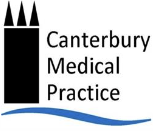Women aged between 24 and 64 should have a cervical screening every 3 to 5 years to help prevent cervical cancer. The screening is quick and painless and can be done here in the practice.
If you are aged over 24 and have never had a smear test, or if it has been more than 3 to 5 years since your last screening, you should arrange an appointment with our Practice Nurse. You should not have the test while you are having a period or in the 4 days before or after your period as this can affect the sample.
What is cervical screening?
Cervical screening is not a test for cancer. It is a method of preventing cancer by detecting and treating early abnormalities which, if left untreated, could lead to cancer in a woman’s cervix (the neck of the womb).
A sample of cells is taken from the cervix for analysis. A doctor or nurse inserts an instrument (a speculum) to open the woman’s vagina and uses a spatula to sweep around the cervix. Most women consider the procedure to be only mildly uncomfortable.
Early detection and treatment can prevent 75 per cent of cancers developing but like other screening tests, it is not perfect. It may not always detect early cell changes that could lead to cancer.
Who is eligible for cervical screening?
All women between the ages of 25 and 64 are eligible for a free cervical screening test every three to five yearsThe NHS call and recall system invites women who are registered with a GP. It also keeps track of any follow-up investigation, and, if all is well, recalls the woman for screening in three or five years time. It is therefore important that all women ensure their GP has their correct name and address details and inform them if these change.
Women who have not had a recent test may be offered one when they attend their GP or family planning clinic on another matter. Women should receive their first invitation for routine screening at 25.
Why are women under 25 not invited?
This is because changes in the young cervix are normal. If they were thought to be abnormal this could lead to unnecessary treatment which could have consequences for women’s childbearing. Any abnormal changes can be easily picked up and treated from the age of 25. Rarely, younger women experience symptoms such as unexpected bleeding or bleeding after intercourse. In this case they should see their GP for advice.
Why are women over 65 not invited?
Women aged 65 and over who have had three consecutive negative results are taken out of the call recall system. The natural history and progression of cervical cancer means it is highly unlikely that such women will go on to develop the disease. Women aged 65 and over who have never had a test are entitled to one.
What about women who are not sexually active?
The NHS Cervical Screening Programme invites all women between the ages of 25 and 64 for cervical screening. But if a woman has never been sexually active with a man, then the research evidence shows that her chance of developing cervical cancer is very low indeed. We do not say no risk, only very low risk. In these circumstances, a woman might choose to decline the invitation for cervical screening on this occasion. If a woman is not currently sexually active but has had male partners in the past, then we would recommend that she continues screening.

